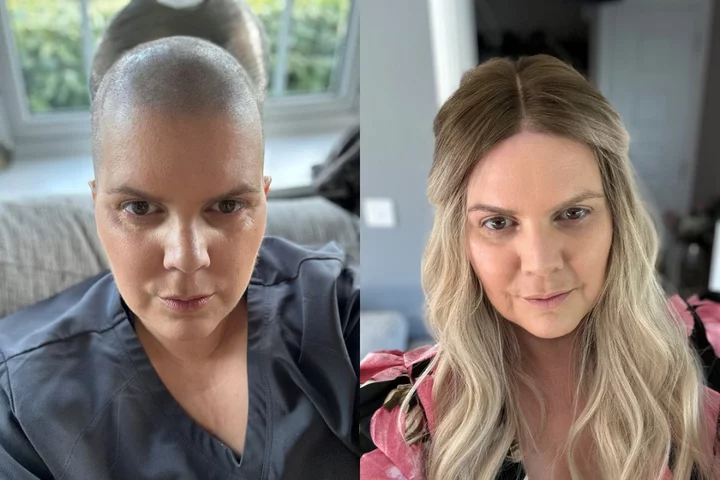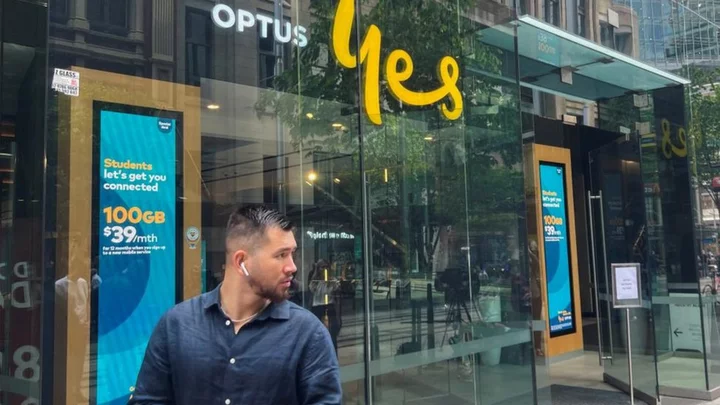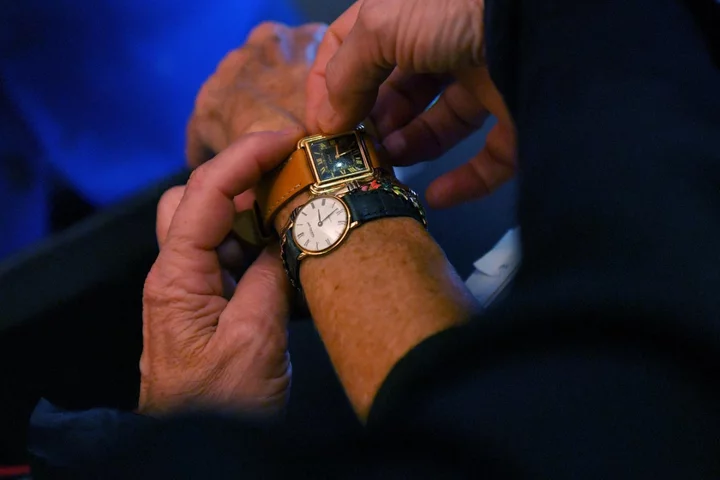
Salon owner with incurable cancer who lost hair during treatment makes customisable wigs to help others feel ‘confident’
A salon owner with incurable cervical cancer who lost her hair while having chemotherapy has said wearing wigs has given her “reassurance in a world where nothing is certain”, and she now sells handmade, customisable bespoke wigs to help others feel “confident” in their own skin. Amanda Humphrey, 43, who owns Saramanda1 hair salon in Great Denham, Bedfordshire, was diagnosed with cervical cancer in October 2017 after delaying her smear test by seven years. She underwent a radical hysterectomy in December that year – a surgical procedure to remove the womb and surrounding tissues – and was in remission weeks later. The cancer returned and Humphrey received her second cervical cancer diagnosis just two days before Christmas in 2021, and she then started chemotherapy and radiotherapy. She described this as “hell on Earth”, and within two weeks of starting chemotherapy the second time, she noticed her hair was being “blown out of [her] head” by the wind. Humphrey shaved her head and embraced her baldness but soon realised she missed having “that comfort blanket” – and she then searched “high and low” for a realistic, non-synthetic wig. Through her own searches, which were often fruitless, she realised that the number of people selling customisable wigs made of human hair in her area were few and far between. This led to Humphrey making and selling her own – and now, despite her uncertain prognosis, she said her mission is helping people struggling with hair loss feel like themselves again. “My message is I get it, and that’s why I love the wigs that we produce,” Humphrey told PA Real Life. “I’m proud of the wigs that we produce, and I’m so grateful that people choose us to be a part of their journey. “Every wig is made with love and strength, they are made from the heart, and me and my entire team, we all want them to be just perfect.” Cervical cancer is a cancer that is found anywhere in the cervix – the opening between the vagina and the womb. Symptoms include unusual vaginal bleeding, changes to vaginal discharge, pain during sex or pain in your lower back, the NHS says. Humphrey, who was working as a detective in London at the time and had only just opened her salon, said she had no symptoms prior to her diagnosis and “always found an excuse to cancel [her] smear test”. It was only when a colleague strongly encouraged her to book her smear test, seven years after she was first invited to have one, that she received her diagnosis in October 2017. She said she holds herself responsible for this and has since campaigned for other women to book their smear tests without delay by sharing the message “Don’t be me”. Speaking about her first diagnosis, she said: “I walked into the room and I looked at the consultant and, before I’d even sat down, I said ‘Have I got cancer?’ And he said ‘Yes’. “Then I said ‘Am I going to die?’ And he said, ‘I need to examine you and then I can tell you.’” Humphrey explained that telling her son, who she wishes to keep anonymous, was the hardest part, and she later underwent a radical hysterectomy, which was performed via keyhole surgery. A biopsy revealed she was in remission just weeks later, and while this was positive news she felt “lost” afterwards. She did not process the “trauma” of the cancer and the fact she could no longer get pregnant due to the radical hysterectomy until much later. “Emotionally I struggled because although I didn’t necessarily want more children, I wasn’t ready to to lose that option,” Humphrey explained. “I grieved not having more children, I grieved something I didn’t have, and I never sought help on that, ever. “Given it’s a gynaecological cancer as well, when I visit my local hospital for any appointment, I sit in a room with pregnant people waiting for their appointments. “They come out of their appointments happy, with their files and scan photos, and you’re sitting there, thinking ‘I can’t have that any more’.” In the years that followed, after Humphrey was medically retired from the police, she continued with cervical cancer awareness campaigns and focused on her salon. However, she started to experience agonising pain in her left leg in 2021 and could not pinpoint the exact source of it. After undergoing scans and tests, she was diagnosed with cervical cancer recurrence just two days before Christmas that year. She then underwent chemotherapy and radiotherapy, which caused her to experience sickness, muscle aches, nose bleeds and ulcers in her mouth. During her second round of chemotherapy she lost her hair within two weeks. “I remember saying to one of the nurses ‘The next time I see you in three weeks, will I have hair?’ And she just said ‘No’, and it was true,” Humphrey said. “I was stood outside my salon on week two and it was really windy and I was trying to make a phone call outside. “I said to my colleague ‘My hair is being blown out of my head’ – it was literally just floating past us – so we shaved it off.” Humphrey said she embraced being “bald and proud” initially, but she missed the “comfort” that having hair gave her – and so her journey to creating her own human hair wigs began. Each wig starts from approximately £450, depending on the length and thickness, and can take up to three weeks to make as Humphrey and her team at the salon custom-colour each one. Humphrey said she will often “work into the night” to finish an order, if required, and some customers have even cried when seeing the finished product. She has since partnered with Jo’s Cervical Cancer Trust as well, and for every wig sold through the charity she will donate 10 per cent of the proceeds to the organisation. She explained: “Wearing wigs has given me so much reassurance in a world where nothing is certain. “Just having a wig on gives me that comfort and ability to just be normal, and I want to help others achieve that feeling.” In October 2022, Humphrey was informed her cancer is incurable and she will most likely not reach remission again – however she is determined to keep fighting. She is now having pembrolizumab – a type of immunotherapy – and has regular check-ups, and although she was told that statistically she may only have 18 months to live, she said she wants to “prove everyone wrong, even if (she dies) trying”, and she will not stop her “passion” of making wigs for others. “The results we get are amazing, they’re happy, and being able to support someone with part of their journey is so rewarding – it’s always something I’ve wanted to do,” she said. “It helps them feel confident, and the comfort comes in, but it’s just the fact they can walk out their front door feeling normal.” She added: “If my journey can help someone in the future, then I’m all in.” To find out more about Humphrey and the wigs she and her team make, search @saramanda1_wigs on Instagram. For more information and support about cervical cancer, visit Jo’s Cervical Cancer Trust’s website here. Read More Witch achieves ‘heightened sense of fulfilment’ after self-marriage ceremony If being without your phone fills you with dread, you could have nomophobia Nursery places and wraparound childcare plans announced Is scalp exfoliation the key to healthier hair? Why do some people love horror movies? TikTok influencers warn about ‘potent’ steroid cream risks among black women – dermatologist explains the risks
2023-11-08 17:26

Malaysia will maintain ties with Hamas says PM Anwar Ibrahim
Analysts say Mr Anwar's stand is politically expedient in as the Palestinians enjoy wide support in Malaysia.
2023-11-08 15:46

Hamas hostages: Israeli mothers their children being kidnapped by Hamas
Renana Jacob says the last time she spoke to her son, he was telling attackers he was "too young" to be taken.
2023-11-08 14:59

Ivanka Trump is pulled back into her father's orbit
She has kept a low profile since the end of the Trump presidency, but will now take the stand in a fraud trial.
2023-11-08 10:26

Optus outage: Millions affected by Australian network issues
Optus - the country's second-largest telecoms provider - has not yet identified the source of the issue.
2023-11-08 10:23

6 of the Best Early Black Friday Sales You Can Shop at Best Buy, Wayfair, and More
Discover the best early Black Friday sales for 2023 that are worth shopping right now at Wayfair, Best Buy, Target, and other leading retailers.
2023-11-08 07:26

Should we end daylight saving time? Doctors think it’s bad for our health
Doctors have called for the elimination of daylight saving time citing potential harm that may result from the practice. Daylight saving time is a practice of setting the clock forward by an hour beginning on the second Sunday in March in order to use light from the sun for longer. Once winter arrives, clocks are then set backwards an hour, ending the practice around the first Sunday of November, so people can get an extra hour of sleep. Doctors from the American Academy of Sleep Medicine (AASM) called for an end to the practice, citing potential harms that can result due to changes to and from daylight saving time. Instead, they are in favour of setting standard time, which is the time when the clocks are set back in the fall, permanently. Doctors say such a permanent standard time aligns best with the human body’s natural inner clock. “By causing the human body clock to be misaligned with the natural environment, daylight saving time increases risks to our physical health, mental well-being, and public safety. Permanent standard time is the optimal choice for health and safety,” Adeel Rishi, chair of the AASM Public Safety Committee, said in a statement. AASM had previously shown in a study in 2020 that Daylight Saving Time (DST) is linked to “increased risks of motor vehicle accidents, cardiovascular events, and mood disturbances” as people annually “spring forward” to adopt the practice. Previous research has also found that pushing the clock back an hour can impact mental health. An analysis of data from more than 185,000 Danish people found an over 10 per cent rise in depressive episodes during the shift from summer time to standard time. The position to end DST is also supported by previous statements adopted by organisations such as National Sleep Foundation and the American Medical Association. “Permanent standard time helps synchronize the body clock with the rising and setting of the sun. This natural synchrony is optimal for healthy sleep, and sleep is essential for health, mood, performance, and safety,” James A Rowley, president of the AASM, said. However, the US Senate has passed The Sunshine Protection Act in March 2022, which would make US daylight saving time permanent. But this bill still requires approval by the House and president Joe Biden to be coded into law. Read More Here’s what a sleep expert says about the time change as clocks change in US Daylight saving time 2023: When do the clocks go back in the US? This is what changing the clocks can do to your health Mother of newborn triplets shares how they react differently after eating Stephen Fry uses walking stick after breaking his leg, pelvis and ‘a bunch of ribs’ Mother’s song about how easy it is to be ‘such a good dad’ goes viral
2023-11-08 06:55

Third Republican debate: When is it, who's on stage and what's at stake
Five candidates will spar in Miami on Wednesday, but frontrunner Donald Trump will again be absent.
2023-11-08 05:27

Christmas Creep: Why Holiday Candy Is Already Everywhere
'Christmas creep' is getting stronger, with chocolate Santas popping up the second Halloween wraps. Here's why.
2023-11-08 04:57

Gaza journalist killed alongside 42 relatives, news agency says
Mohammad Abu Hasira's death comes as a watchdog says the past month has been the most deadly for journalists.
2023-11-08 03:53

US election day 2023: What to watch for as Americans go to polls
Political prognosticators are monitoring the races for clues a year before the 2024 presidential election.
2023-11-08 01:20

Dozens of Canadians have left Gaza but hundreds remain
It's the first time Canadians have been able to leave the embattled enclave since the war began.
2023-11-08 01:19
